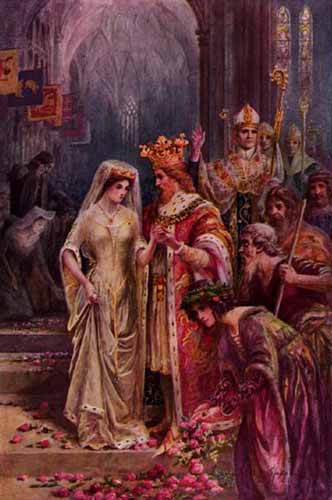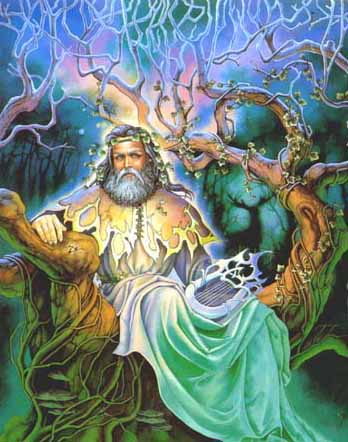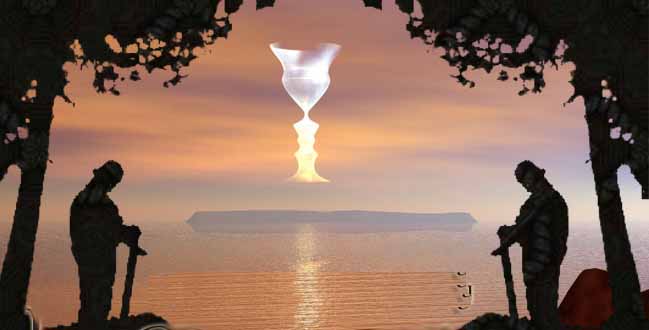AVALON
The Theosophy
King Arthur Pages

King
Arthur’s
Marriage
to Guinevere
King Arthur
Fact or Myth
Kings Arthur
has appeared in many ancient legends and although his story has been
embellished by many writers, we can be certain that the story of King Arthur is
based on the life real charismatic military leader.
So who might
King Arthur have been?
We can be
certain King Arthur was not a medieval King with a council of knights in suits
of armour and a big castle called Camelot that looks
something like the North Wales castles built by English King Edward 1 (1272
-1307).
We know very
little historically but if we accept that he existed, then King Arthur was
probably a 5th century warrior chief who protected his peoples from the Saxon
invaders for a time.
The battle of Camlan probably took place and is connected to King Arthur,
but virually everything
about King Arthur is conjecture. He could have come
from
King Arthur
was said to be the son of Uther Pendragon
and Ygraine of
Arthur is a
near mythic figure in Celtic stories such as Culhwch
and Olwen. In early chronicles he is presented as a
military leader, the dux bellorum suggesting a conncetion with the declining post Roman Britain of the
time.
In later
romance he is a king and emperor. The Tudor monarchs traced their lineage to
King Arthur and used that connection as a justification for their occupation of
the English throne.
Irrespective
of whether King Arthur was real or mythical, it cannot be denied that King
Arthur has been a major influence on literature, from the early Middle Ages to the present day. And although if King Arthur
had been a "real" king, he would have lived around the 5th or 6th
centuries, it is more as a Middle Ages knight that he
is presented in literature.
From Malory to Tennyson to T. H. White. The central story is of a noble kingdom of high
ideals, whose ideals are undermined by the adultery of Queen Guinevere with
Lancelot, the most noble of
all the knights. And eventually
brought down by the treachery of Mordred. In
spite of this, Arthur's memory lives on. Historia Brittonum (written c.830AD) says “Arthur fought against
them [the Saxon invaders] in those days, together with the kings of the
Britons, but he was the leader in battles [dux bellorum].”
The rest of the text lists a number of his supposed battles of which the
other historical sources (Gildas’s
De Excidio Britanniae of
c.540AD, which mentions the battle but not Arthur).
The main
impetus for Arthurian stories starts with Geoffrey of Monmouth who records
Arthur's birth, childhood, ascension to the throne, military conquests, and
death. He places King Arthur as living from the late fifth century to 542,
when the king was mortally wounded in his last battle.
This story became the basis of the Arthurian legend, and was built on by
Chrétien de Troyes and Sir Thomas Malory.
Geoffrey completed
his History around 1130, using earlier sources such as Gildas,
Nennius, The Annales Cambriae and Bede. But none of these makes any subsantial
mention of a King Arthur. So where did he get his facts? Geoffrey claimed to
have had in his possession a "certain very ancient book written in the
British language." However nobody else has used this book, and if it
existed, has not been passed down to modern times
Other attempts
to fill-out the above concept of King Arthur have focused on trying to localise this Arthur. Arthur has been placed by various
researchers as the war-leader in the North of
are too vague to tie him down.
But the main
source of Arthurian myths did not come from British English writings. Rather
from French authors living in
They might
well have based their tales on stories told by English Crusaders in the 11th
century, but they undoubtedly embroidered these stories themselves. These early
romantic novelists
gave us most of the myths that was later further
embroidered by Malory and Tennyson.
So really King
Arthur, the 'King of the Britons' was in probably a French invention, as are so
many of the details of the legend that come from these early French
writers. Lancelot, his affair with Guinevere, Excalibur, Camelot, the Round
Table, Sir Perceval all originate with these French writers.
And at roughly
the same time Geoffrey of Monmouth was writing his History of the
Kings of
Arthur goes on
to invade France, defeats the Roman armies and almost
conquers the remnants of the
It seems that
there was a war leader, whose name we do not know, who defeated the Saxons,
checking their advance temporarily. As time went by people
remembered this leader fondly, the good old days and a touch
of "Oh, if only ... was our leader now". Eventually the name Arthur
stuck as his name in folk memory, and his ascribed deeds grew long after his
death - King Arthur arrives, the once and future king.
Theosophy
Avalon

King
Arthur &
The
Round Table

Merlin
& The Tree of Life
Merlin the Magician
Born circa 400 CE ; Welsh:
Myrddin;
Latin: Merlinus; English:
Merlin.

The
Holy Grail
The Theosophy
King
Arthur Pages
____________________
General pages
about Wales, Welsh History
and The History of
Theosophy in Wales
Theosophy links
The Most Basic Theosophy
Website in the Universe
A quick overview of Theosophy
and the Theosophical Society
If you run a Theosophy Group you
can use this as an introductory handout.
Independent Theosophical Blog
One liners and quick explanations
About aspects of Theosophy
H P Blavatsky is usually
the only
Theosophist that most
people have ever
heard
of. Let’s put that right
The Voice of the Silence Website
An
Independent Theosophical Republic
Links
to Free Online Theosophy
Study
Resources; Courses, Writings,
A selection of articles on Reincarnation
by Theosophical writers
Provided in response to the large
number of enquiries we receive at
The Voice of the Silence Website
The Spiritual Home of Urban Theosophy
The Earth Base for Evolutionary Theosophy
Theosophical
Glossary
Published
1892
A
B
C
D
EFG
H
IJ
KL
M
N
OP
QR
S
T
UV
WXYZ
Try these if you are looking
for a
local Theosophy Group or Centre
UK Listing of Theosophical Groups